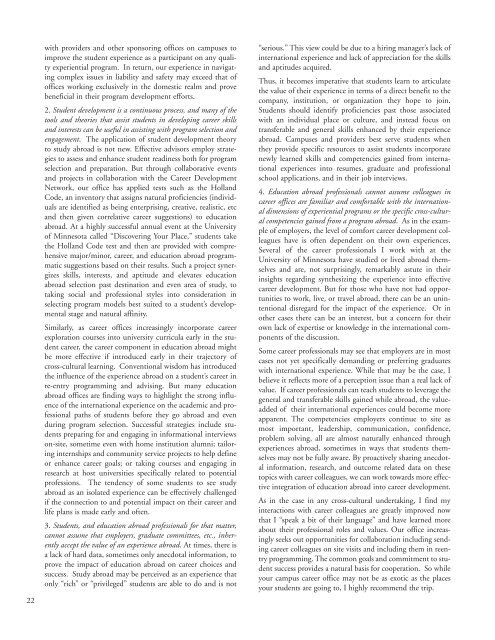Impact of Education Abroad on Career Development, Vol I - AIFS
Impact of Education Abroad on Career Development, Vol I - AIFS
Impact of Education Abroad on Career Development, Vol I - AIFS
You also want an ePaper? Increase the reach of your titles
YUMPU automatically turns print PDFs into web optimized ePapers that Google loves.
22with providers and other sp<strong>on</strong>soring <str<strong>on</strong>g>of</str<strong>on</strong>g>fices <strong>on</strong> campuses toimprove the student experience as a participant <strong>on</strong> any qualityexperiential program. In return, our experience in navigatingcomplex issues in liability and safety may exceed that <str<strong>on</strong>g>of</str<strong>on</strong>g><str<strong>on</strong>g>of</str<strong>on</strong>g>fices working exclusively in the domestic realm and provebeneficial in their program development efforts.2. Student development is a c<strong>on</strong>tinuous process, and many <str<strong>on</strong>g>of</str<strong>on</strong>g> thetools and theories that assist students in developing career skillsand interests can be useful in assisting with program selecti<strong>on</strong> andengagement. The applicati<strong>on</strong> <str<strong>on</strong>g>of</str<strong>on</strong>g> student development theoryto study abroad is not new. Effective advisors employ strategiesto assess and enhance student readiness both for programselecti<strong>on</strong> and preparati<strong>on</strong>. But through collaborative eventsand projects in collaborati<strong>on</strong> with the <strong>Career</strong> <strong>Development</strong>Network, our <str<strong>on</strong>g>of</str<strong>on</strong>g>fice has applied tests such as the HollandCode, an inventory that assigns natural pr<str<strong>on</strong>g>of</str<strong>on</strong>g>iciencies (individualsare identified as being enterprising, creative, realistic, etcand then given correlative career suggesti<strong>on</strong>s) to educati<strong>on</strong>abroad. At a highly successful annual event at the University<str<strong>on</strong>g>of</str<strong>on</strong>g> Minnesota called “Discovering Your Place,” students takethe Holland Code test and then are provided with comprehensivemajor/minor, career, and educati<strong>on</strong> abroad programmaticsuggesti<strong>on</strong>s based <strong>on</strong> their results. Such a project synergizesskills, interests, and aptitude and elevates educati<strong>on</strong>abroad selecti<strong>on</strong> past destinati<strong>on</strong> and even area <str<strong>on</strong>g>of</str<strong>on</strong>g> study, totaking social and pr<str<strong>on</strong>g>of</str<strong>on</strong>g>essi<strong>on</strong>al styles into c<strong>on</strong>siderati<strong>on</strong> inselecting program models best suited to a student’s developmentalstage and natural affinity.Similarly, as career <str<strong>on</strong>g>of</str<strong>on</strong>g>fices increasingly incorporate careerexplorati<strong>on</strong> courses into university curricula early in the studentcareer, the career comp<strong>on</strong>ent in educati<strong>on</strong> abroad mightbe more effective if introduced early in their trajectory <str<strong>on</strong>g>of</str<strong>on</strong>g>cross-cultural learning. C<strong>on</strong>venti<strong>on</strong>al wisdom has introducedthe influence <str<strong>on</strong>g>of</str<strong>on</strong>g> the experience abroad <strong>on</strong> a student’s career inre-entry programming and advising. But many educati<strong>on</strong>abroad <str<strong>on</strong>g>of</str<strong>on</strong>g>fices are finding ways to highlight the str<strong>on</strong>g influence<str<strong>on</strong>g>of</str<strong>on</strong>g> the internati<strong>on</strong>al experience <strong>on</strong> the academic and pr<str<strong>on</strong>g>of</str<strong>on</strong>g>essi<strong>on</strong>alpaths <str<strong>on</strong>g>of</str<strong>on</strong>g> students before they go abroad and evenduring program selecti<strong>on</strong>. Successful strategies include studentspreparing for and engaging in informati<strong>on</strong>al interviews<strong>on</strong>-site, sometime even with home instituti<strong>on</strong> alumni; tailoringinternships and community service projects to help defineor enhance career goals; or taking courses and engaging inresearch at host universities specifically related to potentialpr<str<strong>on</strong>g>of</str<strong>on</strong>g>essi<strong>on</strong>s. The tendency <str<strong>on</strong>g>of</str<strong>on</strong>g> some students to see studyabroad as an isolated experience can be effectively challengedif the c<strong>on</strong>necti<strong>on</strong> to and potential impact <strong>on</strong> their career andlife plans is made early and <str<strong>on</strong>g>of</str<strong>on</strong>g>ten.3. Students, and educati<strong>on</strong> abroad pr<str<strong>on</strong>g>of</str<strong>on</strong>g>essi<strong>on</strong>als for that matter,cannot assume that employers, graduate committees, etc., inherentlyaccept the value <str<strong>on</strong>g>of</str<strong>on</strong>g> an experience abroad. At times, there isa lack <str<strong>on</strong>g>of</str<strong>on</strong>g> hard data, sometimes <strong>on</strong>ly anecdotal informati<strong>on</strong>, toprove the impact <str<strong>on</strong>g>of</str<strong>on</strong>g> educati<strong>on</strong> abroad <strong>on</strong> career choices andsuccess. Study abroad may be perceived as an experience that<strong>on</strong>ly “rich” or “privileged” students are able to do and is not“serious.” This view could be due to a hiring manager’s lack <str<strong>on</strong>g>of</str<strong>on</strong>g>internati<strong>on</strong>al experience and lack <str<strong>on</strong>g>of</str<strong>on</strong>g> appreciati<strong>on</strong> for the skillsand aptitudes acquired.Thus, it becomes imperative that students learn to articulatethe value <str<strong>on</strong>g>of</str<strong>on</strong>g> their experience in terms <str<strong>on</strong>g>of</str<strong>on</strong>g> a direct benefit to thecompany, instituti<strong>on</strong>, or organizati<strong>on</strong> they hope to join.Students should identify pr<str<strong>on</strong>g>of</str<strong>on</strong>g>iciencies past those associatedwith an individual place or culture, and instead focus <strong>on</strong>transferable and general skills enhanced by their experienceabroad. Campuses and providers best serve students whenthey provide specific resources to assist students incorporatenewly learned skills and competencies gained from internati<strong>on</strong>alexperiences into resumes, graduate and pr<str<strong>on</strong>g>of</str<strong>on</strong>g>essi<strong>on</strong>alschool applicati<strong>on</strong>s, and in their job interviews.4. <str<strong>on</strong>g>Educati<strong>on</strong></str<strong>on</strong>g> abroad pr<str<strong>on</strong>g>of</str<strong>on</strong>g>essi<strong>on</strong>als cannot assume colleagues incareer <str<strong>on</strong>g>of</str<strong>on</strong>g>fices are familiar and comfortable with the internati<strong>on</strong>aldimensi<strong>on</strong>s <str<strong>on</strong>g>of</str<strong>on</strong>g> experiential programs or the specific cross-culturalcompetencies gained from a program abroad. As in the example<str<strong>on</strong>g>of</str<strong>on</strong>g> employers, the level <str<strong>on</strong>g>of</str<strong>on</strong>g> comfort career development colleagueshave is <str<strong>on</strong>g>of</str<strong>on</strong>g>ten dependent <strong>on</strong> their own experiences.Several <str<strong>on</strong>g>of</str<strong>on</strong>g> the career pr<str<strong>on</strong>g>of</str<strong>on</strong>g>essi<strong>on</strong>als I work with at theUniversity <str<strong>on</strong>g>of</str<strong>on</strong>g> Minnesota have studied or lived abroad themselvesand are, not surprisingly, remarkably astute in theirinsights regarding synthesizing the experience into effectivecareer development. But for those who have not had opportunitiesto work, live, or travel abroad, there can be an unintenti<strong>on</strong>aldisregard for the impact <str<strong>on</strong>g>of</str<strong>on</strong>g> the experience. Or inother cases there can be an interest, but a c<strong>on</strong>cern for theirown lack <str<strong>on</strong>g>of</str<strong>on</strong>g> expertise or knowledge in the internati<strong>on</strong>al comp<strong>on</strong>ents<str<strong>on</strong>g>of</str<strong>on</strong>g> the discussi<strong>on</strong>.Some career pr<str<strong>on</strong>g>of</str<strong>on</strong>g>essi<strong>on</strong>als may see that employers are in mostcases not yet specifically demanding or preferring graduateswith internati<strong>on</strong>al experience. While that may be the case, Ibelieve it reflects more <str<strong>on</strong>g>of</str<strong>on</strong>g> a percepti<strong>on</strong> issue than a real lack <str<strong>on</strong>g>of</str<strong>on</strong>g>value. If career pr<str<strong>on</strong>g>of</str<strong>on</strong>g>essi<strong>on</strong>als can teach students to leverage thegeneral and transferable skills gained while abroad, the valueadded<str<strong>on</strong>g>of</str<strong>on</strong>g> their internati<strong>on</strong>al experiences could become moreapparent. The competencies employers c<strong>on</strong>tinue to site asmost important, leadership, communicati<strong>on</strong>, c<strong>on</strong>fidence,problem solving, all are almost naturally enhanced throughexperiences abroad, sometimes in ways that students themselvesmay not be fully aware. By proactively sharing anecdotalinformati<strong>on</strong>, research, and outcome related data <strong>on</strong> thesetopics with career colleagues, we can work towards more effectiveintegrati<strong>on</strong> <str<strong>on</strong>g>of</str<strong>on</strong>g> educati<strong>on</strong> abroad into career development.As in the case in any cross-cultural undertaking, I find myinteracti<strong>on</strong>s with career colleagues are greatly improved nowthat I “speak a bit <str<strong>on</strong>g>of</str<strong>on</strong>g> their language” and have learned moreabout their pr<str<strong>on</strong>g>of</str<strong>on</strong>g>essi<strong>on</strong>al roles and values. Our <str<strong>on</strong>g>of</str<strong>on</strong>g>fice increasinglyseeks out opportunities for collaborati<strong>on</strong> including sendingcareer colleagues <strong>on</strong> site visits and including them in reentryprogramming. The comm<strong>on</strong> goals and commitment to studentsuccess provides a natural basis for cooperati<strong>on</strong>. So whileyour campus career <str<strong>on</strong>g>of</str<strong>on</strong>g>fice may not be as exotic as the placesyour students are going to, I highly recommend the trip.


